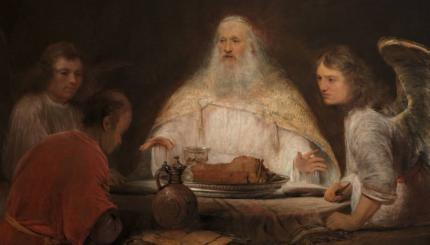Provided by American Jewish World Service, pursuing global justice through grassroots change.
In Parashat Lekh L’kha, Abram and Sarai, the first Jews, “go forth” from their old lives into a relationship with the one God, and the Jewish story begins. Embedded within this story is a short interlude, the tale of Hagar, whose very name (ha-ger) means “the stranger,” the “outsider.” Both Hagar’s encounters with God and the placement of her story inside Abram and Sarai’s tell us something important about our role as Jews in the work for global justice.
 As recounted in Genesis, a childless Sarai offers her Egyptian slave, Hagar, to Abram with the intention of making Hagar’s child her own. But when Hagar becomes pregnant, Sarai mistreats her, forcing her to flee to the desert. There, an angel of God appears and tells her to go back, promising that she will be the mother of a great nation.
As recounted in Genesis, a childless Sarai offers her Egyptian slave, Hagar, to Abram with the intention of making Hagar’s child her own. But when Hagar becomes pregnant, Sarai mistreats her, forcing her to flee to the desert. There, an angel of God appears and tells her to go back, promising that she will be the mother of a great nation.
In response to God’s acknowledgement of her, Hagar gives God a name, the only person in all of Torah to do so. And what a name it is: “El-Roi–the God who sees me.” Seeing–and its higher meaning, understanding–is a central theme of this story. In particular, God sees Hagar’s reality in a way that Sarai and Abram don’t.
With your help, My Jewish Learning can provide endless opportunities for learning, connection and discovery.
Reproductive Health Around the World
Reproductive health was at the heart of both Hagar’s exploitation and her power, and reproductive rights remain central to the lives and challenges of women around the world. Family planning is indispensable to social, political, and economic development, yet, like Hagar, millions of women lack the right to choose when, or even if, they will have children.
More than half the women in some countries report that they would have preferred to postpone or avoid their most recent birth. Additionally, unwanted pregnancies are directly tied to 19 million unsafe abortions every year, a leading cause of maternal mortality. Even though there is a greater risk of injury and death when adolescents bear children, 82 million girls 17-years-old and under are married each year. Reproductive health issues are the leading cause of death for women in the developing world.
In Africa, the impact of AIDS falls most heavily on women–they are 30 percent more likely than men to become infected. The devastation goes far beyond individual families. In Africa, the AIDS crisis is contributing to the danger of famine, since many women can no longer work in the fields. The disease is eroding the skills, experience, and networks that keep communities going.
AIDS and reproductive rights go hand-in-hand. Women often do not have the power to negotiate sex, safer sex, or contraception within their sexual relationships. In some communities, a woman’s request to her partner to use a condom is seen as proof of infidelity.
An Issue of Gender Discrimination
Addressing these problems requires seeing them as more than straightforward public health issues and instead as issues of gender discrimination. Women all over the world are deprived of basic information on contraception and the prevention of sexually transmitted diseases. This denial of potentially life-saving assistance and information is, remarkably, reinforced by the U.S. government’s Mexico City Policy–often called the “global gag rule”–which excludes from U.S. government funding any non-governmental organization that provides or even promotes services related to abortion.
As Jews engaged in social justice work, we have an obligation to emulate God’s relationship with Hagar. How extraordinary it is that, at the very beginning of our foundational narrative, the Torah includes a story about the mistreatment of a marginalized woman–in particular, the exploitation of her sexuality and reproductive capacity.
By including it in such a prominent place, the Torah is telling us that God cares about those “outside” the Jewish community, that our lives as Jews are connected to those of the “stranger,” braided tightly together like the lives of Abram, Sarai, and Hagar.
With knowledge of the startling statistics, we have an obligation to respond, to truly see the women of our global community. These women must be full partners in designing programs for change and in deciding the changes they want to make and how they want to go about making them.
There is nothing more empowering than to be seen like Hagar, really seen, for who one is and what one really needs. As God saw and protected Hagar in her vulnerability and exploitation, so must we. When we see our women partners as they see themselves, we are doing the work of El-Roi.
Torah
Pronunced: TORE-uh, Origin: Hebrew, the Five Books of Moses.


